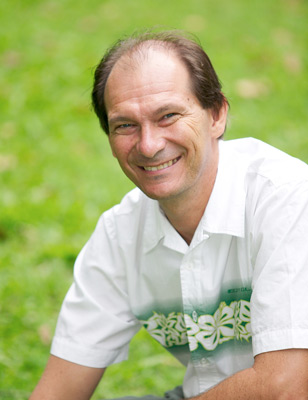Detecting human, animal and plant diseases in a coffee mug
Have you ever wondered what happens after the doctor sends away your sample for analysis? In Australia, it will be picked up, transported to a specialised laboratory in your town, analysed by highly trained personnel using sophisticated equipment and the results delivered online to your doctor within 1-2 days. What if your cow is sick? The process is pretty much the same but the sample might need to go to a different town.
If you or your cow live in PNG or Cambodia - that's a completely different story. Most of the time your cow will be dead, your crop will be gone and your health down the drain by the time you get a diagnosis, if you ever get one.
Molecular, DNA-based, diagnostics are the most sensitive method available today, but they need sophisticated laboratory facilities, the equipment is very expensive and fragile, the reagents need to be refrigerated and personnel need to be highly trained. In a nutshell, just the opposite of what you find in many developing economies around the world.
Scientists believe molecular diagnostics can be reinvented to benefit those people who need them most, and over the last 10 years a team of UQ researchers have done just that.
At this month's BrisScience, learn how they have developed extremely simple methods and materials to allow disease diagnostics in ‘resource-poor environments’. DNA is purified with a ‘dipstick’ that cost less than a cent and the reaction is ran in a modified coffee mug that can be powered by the car lighter, it collects the data, interprets the data and communicate with your mobile phone using Bluetooth and an phone App to tell you the result.
Among other things, they have successfully detected phytoplasma diseases in the jungle of PNG, cacao diseases in West Africa and E. coli contamination in Cambodian markets. And our technology could be easily adapted to detect COVID-19 at your GP surgery if you are willing to wait for 30 minutes.
Watch the recording
Recording of "Detecting human, animal and plant diseases in a coffee mug" talk (YouTube, 45min)
Meet the presenter
 Professor Jimmy Botella is a Professor of Plant Biotechnology at The University of Queensland, Australia. He obtained a degree in Quantum Chemistry from the University of Madrid (Spain) and a PhD in Biochemistry from the University of Malaga (Spain). In 1995 he joined The University of Queensland where he established the Plant Genetic Engineering Laboratory (PGEL) specialising in the fields of tropical and subtropical agricultural biotechnology.
Professor Jimmy Botella is a Professor of Plant Biotechnology at The University of Queensland, Australia. He obtained a degree in Quantum Chemistry from the University of Madrid (Spain) and a PhD in Biochemistry from the University of Malaga (Spain). In 1995 he joined The University of Queensland where he established the Plant Genetic Engineering Laboratory (PGEL) specialising in the fields of tropical and subtropical agricultural biotechnology.
Professor Botella has eleven international patents in the field of Plant Biotechnology, has founded two biotechnology companies and is a member of the Expert Scientific Panel for the Agricultural Biotechnology Council of Australia. He has published 130 scientific publications which have been cited in excess of 6,500 times. He has been awarded the Chinese Academy of Sciences Visiting Professorship for Senior International Scientists.
His research interests include biotechnological approaches for crop improvement, genome editing, plant defence signalling and point-of-care diagnostics.
About BrisScience
BrisScience is a monthly lecture series that brings science out of the labs and to the people, making it accessible to all – from scientists, to scientists-at-heart.
Run by The University of Queensland, BrisScience has been delivering engaging lectures on diverse topics from local and international scientists for over a decade.
BrisScience speakers are leaders in their given fields and deliver dynamic presentations based on cutting-edge research.
The University of Queensland has been running BrisScience since 2005, bringing the best and brightest scientific minds to the people of Brisbane – from early career researchers to Nobel Laureates!
| Time | 6:30pm to 7:45pm (light refreshments 7:45-8:30pm) |
|---|---|
| Venue | Auditorium 1, State Library of Queensland, Stanley Place, South Bank |
| Cost | Free - Eventbrite ticket required |
Subscribe
Sign up to be on our mailing list and be the first to know the latest BrisScience news, events and announcements!
The mailing list is used only to advertise upcoming BrisScience talks. If at any time you decide that you no longer wish to receive the emails, you can unsubscribe from the bottom of your latest email.




